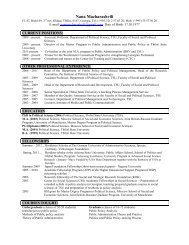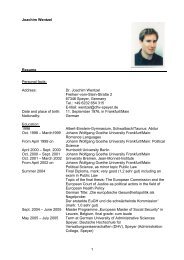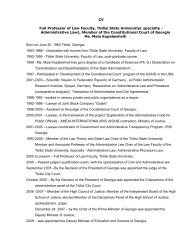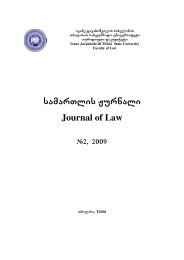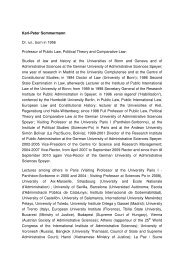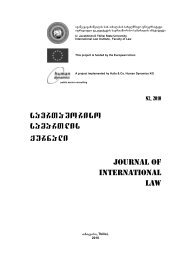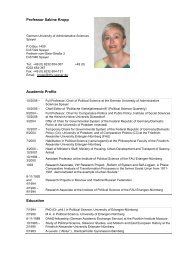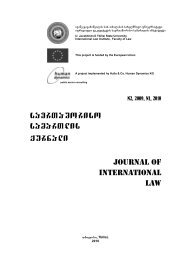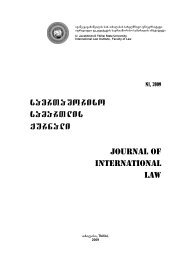Untitled
Untitled
Untitled
Create successful ePaper yourself
Turn your PDF publications into a flip-book with our unique Google optimized e-Paper software.
I. KURDADZE, STAGES OF DEVELOPMENT OF SCIENTIFIC CONCEPTS ON CORRELATION BETWEEN ...<br />
none of them can act in isolation from another<br />
and these systems are interrelated and<br />
concurrent. 18<br />
At the same time, almost all of them, in<br />
one way or the other, recognize the primacy<br />
of international law and not only of international<br />
treaties, with regard to domestic law.<br />
D. Carreau points out the court practice<br />
and the customary and conventional norms<br />
of the contemporary internaitonal law begining<br />
from the end of XIX century. In particular, it<br />
considers the Article 27 of the Vienna Convention<br />
on the Law of Treaties and concludes:<br />
“such a principle of primacy of international<br />
law makes it clear that international law (i.e.<br />
the entire positive law and not only treaties)<br />
in sum stand higher than unity of domestic<br />
norms: the constitutional, legislative, executive<br />
and court decisions. This primacy was recognized<br />
by international arbitration and courts“. 19<br />
Carreau, as well as other scientists, refer<br />
to the court practice in order to prove that<br />
universal international law, including treaties,<br />
stands higher than domestic law. As a rule,<br />
they refer to the same historic facts. Considering<br />
the Montigo case in 1875 the arbitration<br />
found that “treaty is higher than constitution“.<br />
Later, considering the George Pinson<br />
case in 1928 arbitration pointed out that a<br />
treaty concluded between France and Mexico<br />
is higher than the Mexian Concsistion: “there<br />
is no doubt that international law stands higher<br />
thatn domestic law“.<br />
The Permanent Chamber of International<br />
Justice pointed out in its decision of 4 February<br />
1932: “Deriving from the universally recognized<br />
principles, one state, in the dispute<br />
with another state, cannot, based on the own<br />
Constitution free itself from the obligations,<br />
which are placed on it by international law or<br />
a specific treaty“.<br />
The same opinion was expressed by the<br />
International Court of Justice in the 1998 Advisory<br />
Opinion with regard to the Representation<br />
of the Palestine Liberation Organization<br />
(in the Headquarter in New York). 20<br />
P-M. Dupuy is more coscious in making conclusions:<br />
“relation of international and domestic<br />
law is inrrelated and concurrent. The way this<br />
relation is implemented significantly depends on<br />
the constitutional choice of a state. This gives us<br />
a possibility to conclude more or less clearly whether<br />
international law is granted higher hierarcical<br />
stand in relation with the domestic law“. 21<br />
Dailler and Pellet categorically declare: “international<br />
justice and legislative practice, as well<br />
as domestic justice more and more often recognize<br />
that internaitonal law would not have existed<br />
without strengtehning its primacy with regard<br />
to domestic law“. 22<br />
The factual material cited by these authors<br />
is interesting:<br />
At the San-Fransisco Conference in June,<br />
1956 the suggestion of the Belgian delegation<br />
to include into the UN Charter the principle of<br />
primacy of international law was rejected. However,<br />
three years later the United Nations International<br />
Law Commission “the Declaration<br />
of the State Rights and Obligations” draft included<br />
a special article, according to which “every<br />
state is obliged to conduct relations with<br />
other states in accordance with the norms of<br />
international law and the principle according to<br />
which all state sovereignty is subjected to the<br />
primacy of international law” (Art. 14).<br />
The Italian Professor L. Bravo considers<br />
that “at the contemporary stage the problem<br />
of monism-dualism has absolutely theoretical<br />
importance”. 23 However, during the consideration<br />
he himself reaches the conclusion that<br />
international law influences state systems at<br />
the current stage. Even more, the author considers<br />
the cases, when state is compelled to<br />
take into consideration norms of international<br />
law. For example, Bravo refers to jus cogens<br />
norms and points out that national law cannot<br />
outweight such a norm, even if it contains a<br />
different norm of conduct.<br />
The former Chairman of the European<br />
Court of Human Rights Lucius Wildhabberr<br />
possesses extremely interesting position. According<br />
to his position, the support to dualistic<br />
or monistic concepts is a subject of more<br />
ideological considerations, political preferences<br />
or it is at all a utopian view. Especially as<br />
this issue is not a subject of comparative study<br />
vis-à-vis the domestic legal order, as both<br />
concepts, at the end, as a rule, focus on domestic<br />
law. It would be more precise to say<br />
that practically all state domestic legal systems<br />
include the elements of both – monistic and<br />
dualistic systems. He cites the so called supporter<br />
states of the dualistic system as an example:<br />
“in some states (United Kingdom, Ireland,<br />
Canada, Australia and Scandinavian<br />
countries) international treaties require implementation<br />
into domestic law through specific<br />
normative acts. Despite this, courts use the<br />
25



